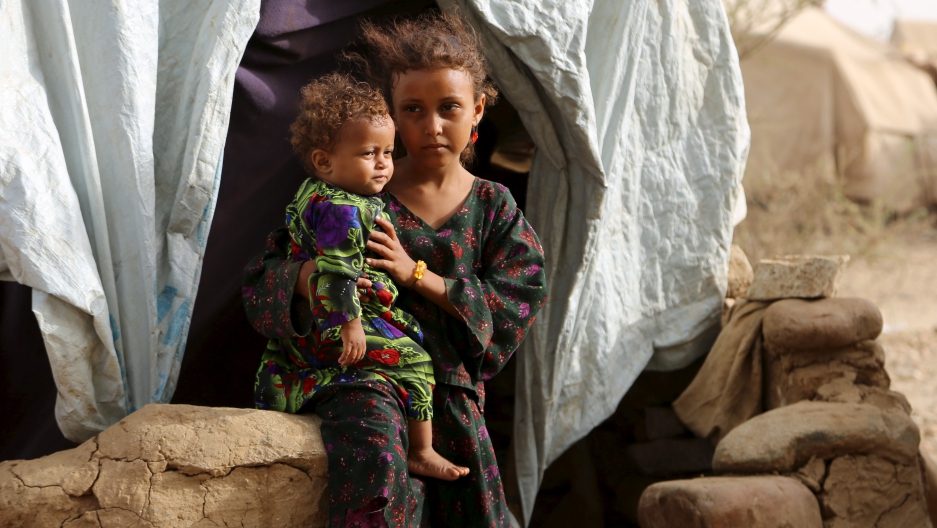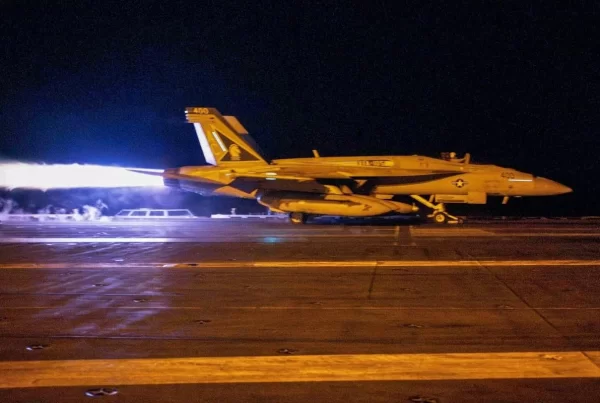Yemen’s warring sides agreed to try a ceasefire in April. It’s holding. They’re negotiating. And while no one describes Yemen today as peaceful, an influential American diplomat looks ahead to a postwar Yemen.
“We have many years, I think, of hard work and struggle in front of us, to try to get Yemen to a stronger and better position than it’s been in,” says Gerald Feierstein, principal deputy assistant secretary at the State Department’s Bureau of Near Eastern Affairs. Feierstein was US ambassador to Yemen from 2010 to 2013.
“I think that when the war is over,” he says, “when we are able to resume the political transition, I hope there will be in place a political dialogue and a basic understanding of how to move forward on the political track.”
Feierstein witnessed the 2011 Arab Spring explode in the streets of the Yemeni capital, Sanaa. He worked through the negotiations that led the longtime Yemeni president, Ali Abdullah Saleh, to step down after 30 years in power.
Feierstein helped push through the Gulf Cooperation Council Initiative. Backed by Saudi Arabia, the United Arab Emirates, the United States and the United Nations, the GCC Initiative was credited with sparing Yemen the widespread civil upheaval that had fractured daily life in Tunisia, Egypt, Libya, Syria and Bahrain. President Obama praised Yemen’s National Dialogue Conference, a key program of the GCC Initiative, for gathering people from across Yemen to forge a plan for the future.
But it did not live up to its promise.
‘We should have pressed harder on that’
“The good news is that the Yemeni people came together in 2011 and 2012 and agreed on a process for the political transition — and also a way to resolve many longstanding issues among Yemenis,” recalls Feierstein. “Unfortunately… the political environment never really coalesced in a way that allowed for success.”
Yemen’s National Dialogue Conference, despite several deadline extensions, concluded at the beginning of 2014 without a constitution, without elections and without buy-in from disenfranchised groups. Hirak — also known as the Southern Movement — was sidelined along with its demands for greater autonomy; and a long-marginalized northern movement led by Abdul-Malik al-Houthi withdrew from the conference out of frustration.
Yemen’s caretaker government, under the former vice president, Abdrabbuh Mansour Hadi, might have prepared Yemenis for a new era of cooperation. Instead, with unaddressed regional grievances and a weakened central government, Yemen was headed for war.
“I think that where we fell short was not in pressing harder with the Yemenis to clean away some of the obstacles of the political opponents, and particularly Ali Abdullah Saleh and his efforts to obstruct the transition. We should have pressed harder on that,” says Ambassador Feierstein. “Elements within Yemen decided that they were going to try to accomplish through violence what they were not able to achieve through political negotiation.”
Yemeni scholar Nadwa Al-Dawsari goes Feierstein one further. “The fundamental problem here was not just … that some elements decided to use violence to achieve whatever,” she observes. “The problem is in the fact that the GCC initiative was by itself deeply flawed.”
Al-Dawsari, who is nonresident senior fellow for the Project on Middle East Democracy in Washington, DC, points to a flaw in the negotiations that set the stage for the current civil war. “It granted [former dictator Ali Abdullah] Saleh immunity, and he remained in control of most of the armed forces, but this time without accountability because he was technically out of power.”
Summer Nasser, a New York-based Yemeni-American student and activist, puts it more bluntly. “If the GCC and Yemen allies did not give Saleh immunity during the signed GCC deal, Yemen currently wouldn’t be in a war, nor would Houthi militia gain this much military and political power within the country.”
Attorney Haykal Bafana, in Sanaa, agrees that the diplomats not only bungled the terms of Ali Abdullah Saleh’s departure, but also underestimated his popular appeal. “The [framers of] the GCC Initiative made a fatal error when they thought of Saleh as a traditional dictator – far from the truth,” Bafana notes. “He has a lot of supporters. And it was a mistake to create a diplomatic framework without taking into account the interests of this large bloc.”
“The problem is that the GCC and National Dialogue process … was actually a fraud process,” says Farea al-Muslimi, co-founder of the Sanaa Center for Strategic Studies. “It is, ultimately, what led to the war. Claiming everything was right or even partly right in the negotiations is a huge mistake and fallacy. Leaving Saleh with unconditional immunity was one part of the problem. The other is that his successor, President Hadi, supported and much loved by the US, mismanaged the political process and manipulated it for his own interest, inspiring others to do the same, but with guns.”
‘Neither Iranians or Saudis are angels of mercy’
In the fall of 2014 Houthi forces swept down from their northern stronghold and occupied the capital with support from strongman Saleh, to whom much of Yemen’s armed forces had remained loyal. The Houthis would meet little resistance in their southward march.
The caretaker president, Hadi, fled house arrest in the capital and set up headquarters in the southern port city, Aden. When the Houthi-Saleh army marched on to Aden, Hadi fled to Saudi Arabia.
It was March 2015, and Yemen’s internal struggle was about to expand into a regional war.
In Riyadh, Abdrabbuh Mansour Hadi, recognized outside Yemen as the nation’s president, asked the Saudis to help restore him to power. By month’s end, Saudi Arabia was bombing Houthi targets in Yemen. The United States fast-tracked arms sales to the Saudi air force, provided intelligence for its air strikes, refueled its jets midair and helped the Saudi navy enforce a coastal blockade intended to prevent weapons shipments from Iran.
Some Yemenis welcomed Saudi efforts to push back the Houthi rebels. “Neither Iranians or Saudis are angels of mercy for Yemen,” says Suha Almujahed, a humanitarian worker from Taiz. “But the Saudi intervention was welcomed by people who were exposed to violence by the Houthi and Saleh forces supported by Iran.”
While there is little evidence of Iranian influence inside Yemen, there is a sense in the Yemeni south – and particuilarly in the Houthi-besieged city of Taiz – that the Saudi intervention helped to prevent a slaughter.
Other Yemenis are focused on the damage caused by Saudi attacks. A UN report notes that nearly two-thirds of the Yemeni civilian deaths in February, for example, were caused by Saudi-led coalition air strikes.
Sanaa-based journalist and human rights activist, Fatik Al-Rodaini, condemns the carnage from Saudi air strikes and holds the US partly responsible. “The former Ambassador says that democracy can be obtained through the war,” he observes. “[But] do you think that we need to kill 3,000 civilians and destroy the whole country in order to restore a legitimacy of Hadi?” he adds, referring to the internationally recognized Yemeni president who has spent most of the past year living in Riyadh.
“Without the support of the US, [the] Saudi war in Yemen [would not] happen,” Al-Rodaini believes.
‘Yemen is no longer one’
You can hear bitterness in the comments from other Yemenis. “How can the Yemeni people trust in any future political transitional initiatives when the USA, and the international community, supported the Saudis to destroy it?” writes Hashim Almansoor, a senior IT consultant in the Yemeni capital.
“Countless civilian casualties can’t be ignored when the majority are directly because of Saudi air strikes,” says a Yemeni-American student, Arabella. “The majority of Saudi targets, aided logistically by [the] US, have no military value and are just meant to instill fear into [the] hearts of Yemenis,” she says.
“When an entire nation is at the brink of starvation, politics need to be set aside,” says Shireen Al-Adeimi, a Yemeni doctoral candidate at Harvard. “We’re depriving people of basic rights like access to food and water in order to instate a political initiative. Is it worth it?” she asks. “The answer from the US’ perspective should be a resounding ‘no,’ and if it’s anything other than that, we undermine our credibility as protectors of human rights.”
“The only “positive” I see from the foreign intervention is that rich countries will be responsible for the destruction,” observes Fatima, a Yemeni woman in Sanaa who asked us not to use her last name. “And for rebuilding — which wouldn’t have been possible if it was [only] a civil war.”
Yemeni-American Sahar Alyafai, a student in Omaha with family and friends in Yemen, says “rebuilding Yemen and stabilizing the humanitarian situation can be done, but what will rebuild, repair the shattered lives and the Yemeni social fabric that’s been torn to pieces.”
Alyafai points out one of the problems with any plan that would try to unify Yemenis under one central government now. “Yemen is now broken into three regions — north, middle and south — not to mention the fractures inside those regions as well. After the war is over the international community will have to change its policy in Yemen based on [a] regional platform, because Yemen is no longer one.”
‘The most immediate issue is the humanitarian crisis’
“I think that there are a number of misunderstandings and misrepresentations of the Saudi position,” responds Feierstein. “The reality is that we and the Saudis agreed on the basic principles that we were trying to accomplish. Which was, in fact, the restoration of the political transition and allowing the GCC initiative to complete its role. And so we have been working closely with the Saudis in trying to accomplish that, trying to implement not only the GCC initiative, but also [a United Nations- sponsored] framework for getting back to the political transition.”
Feierstein, who lived for three years in Sanaa, understands how punishing the war has been for Yemenis.
“What has happened over the course of the conflict has been absolutely tragic for the Yemeni people,” he says, “and yet it’s a mistake to try to implicate the Saudis as the responsible party for that. The Saudis, along with the rest of the international community, have supported the legitimate government and have supported the legitimate and agreed-upon political transition in the country.”
The harm caused by the Saudi-led air strikes and naval blockade, the legitimacy of Hadi’s government, the dangers posed by the Houthis and Ali Abdullah Saleh, the influence of Iran and the role of the United States are all cause for passionate debate among Yemenis.
But the Yemeni people we spoke with — in Yemen and in the US — agree with Feierstein when he says, “I think that the most immediate issue is the humanitarian crisis in Yemen, and the need to complete a process — that started five years ago with the Arab Spring — of political transition, and a way of bringing Yemen into a period of greater security, stability, and hopefully economic prosperity.”
The problem, as ever, will be in the details.






